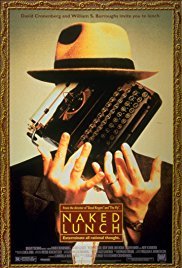 (1991, R) Peter Weller (Bill Lee), Judy Davis (Joan Frost/Joan Lee), Ian Holm (Tom Frost), Julian Sands (Yves Cloquet), Monique Mercure (Fedela), Nicholas Campbell (Hank), Michael Zelnicker (Martin), Robert A. Silverman (Hans), Joseph Scorsiani (Kiki), Roy Scheider (Dr. Benway). Music: Howard Shore. Screenplay: David Cronenberg (based on the book by William S. Burroughs). Director: David Cronenberg. 115 minutes.
(1991, R) Peter Weller (Bill Lee), Judy Davis (Joan Frost/Joan Lee), Ian Holm (Tom Frost), Julian Sands (Yves Cloquet), Monique Mercure (Fedela), Nicholas Campbell (Hank), Michael Zelnicker (Martin), Robert A. Silverman (Hans), Joseph Scorsiani (Kiki), Roy Scheider (Dr. Benway). Music: Howard Shore. Screenplay: David Cronenberg (based on the book by William S. Burroughs). Director: David Cronenberg. 115 minutes.
Tags: Surreal, BeatGen
Notable: Post-Robocop Weller proves an acting ability that pop-critics didn’t think he had; Cronenberg accomplishing writing/filming the most “unfilmable” novel of all time.
Rating: ★★★★★
Part-time bug exterminator and full-time drug addict Bill Lee finds himself seduced into the nightmarish world of Interzone, a place that may not be a place at all, populated by sinister cabals, people who may not be people, and giant talking bugs who seek reports of whatever happenings Bill can find his way into… if, of course, he can find his way back out of them again.
Begin with the knowledge that Burroughs Naked Lunch is, at its essence, utterly unfilmable; it is subjective, abstract, and for all intents and purposes without a coherent plot. Add that Burroughs’ life was of such extremes of self-indulgence, drug use, and general mayhem that, in itself, a biographical film or story would be nearly impossible to describe with any artistic or dramatic flair. Whip together with the vision of David Cronenberg, the writer/director of The Brood, Scanners and Videodrome. Bake in a slow Hollywood oven for a number of years until someone green-lights the project, and the result is this astonishing roller-coaster ride of a film.
The book is a roman a clef, with the film characters of Bill Lee being Burroughs, Hank being Jack Kerouac, and Martin being Alan Ginsberg. Those of you who don’t know about “the beat generation” may turn to the Oxford Dictionaries to discover that it was “a movement of young people in the 1950s who rejected conventional society and favored Zen Buddhism, modern jazz, free sexuality, and recreational drugs. Among writers associated with the movement were Jack Kerouac and Allen Ginsberg.” To quote Stan Lee, ‘nuff said.
A bug exterminator by day, Bill Lee aspires to be a writer, but he is hampered by being unable to find a satisfactory voice for his muse. His creative friends Martin and Hank have conflicting philosophies of writing, and Bill is his own rebel without a cause. Tempted into drug use by his wife Joan, Bill begins to find his waking and drug-imbued worlds merging into something quite literally indescribable, yet he keeps trying to describe it in “reports” about an alternative world called Interzone. Thrown into a surreal and unreal vision of “sinister cabals and talking bugs” (quoted from the material on the DVD case), Bill must struggle through to the end of a self-created conspiracy that grows only more bizarre, the further down the rabbit hole his “writing machine” — his astonishing cocktail of licit and illicit drugs — takes him.
As a writer, I’m struck most by the various metaphors and striking parallels drawn between Bill’s grotesque (in the sense of “a very ugly or comically distorted figure, creature, or image”) vision of being a “successful” writer and the real, equally grotesque circumstances of getting one’s unique vision published in today’s perverse popular vision of “worthy fiction.” The most famous line from Naked Lunch (film and book) is “Everything is permitted; exterminate all rational thought.” In the film, Bill must find his writing voice through drugs, killing his wife (accidentally?), escaping reality, exploring his homosexuality in various perverse ways, turning inside-out every sleeve of his preconceptions, and submitting himself to all experience, good or bad, and spewing forth the results in “reports from the Interzone.” To have one’s work published and promoted by a mainstream publisher, a writer must do much the same thing to his own muse. As Robert Heinlein observed of editors, “Once they piss in your written work, they like the flavor better.”
I like this film very much, hence the five-star rating. I’m not at all certain that I could explain why I like it. It is a comedy, a tragedy, a horrifying LSD trip, a treatise against succumbing to the banal, a misogynistic view of homosexuality as an essential muse, a cautionary tale against opiates interfering with (while simultaneously enhancing) experience as a writer’s flesh and drink, a linear telling of a non-linear philosophy, a non-linear telling of a linear experience, a discovery of what is by discovering what isn’t… Yes, a variety of details and non-details, ultimately resulting in paradox upon conundrum within opposites. To describe my feelings toward this film, or even to describe the film itself, is to express ambiguity and contradiction.
That, perhaps, was both Burroughs’ and Cronenberg’s intention. It is one last, great, mind-wrenching absurdity; whether or not that was their intention, they accomplished it nonetheless. Celebrate it.

This movie was certainly trippy to say the least! The amphibious-fish-thing living technology in eXistenZ was VERY tame compared to all the insectile imagery.